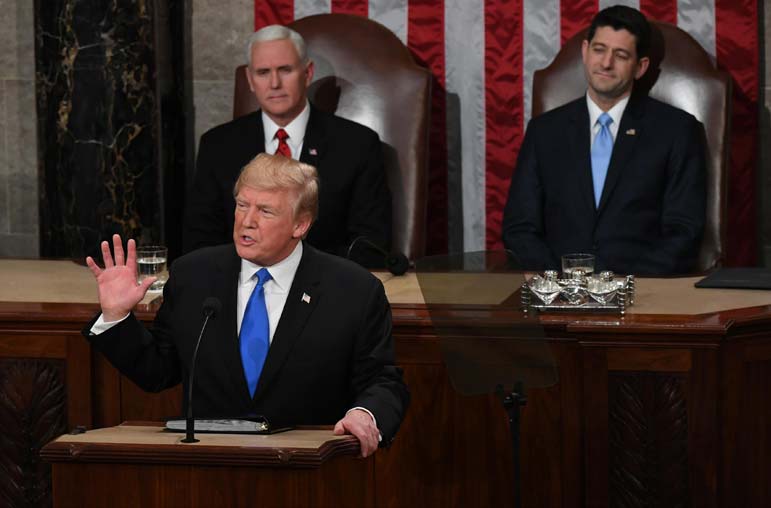 Toni L. Sandys for The Washington Post
Toni L. Sandys for The Washington Post
"Together, we can reclaim our great building heritage," Trump said during his State of the Union address. "We will build gleaming new roads, bridges, highways, railways and waterways all across our land. And we will do it with American heart, American hands and American grit."
A more detailed proposal, which aides say will be unveiled in the next week or two, would be the first marquee initiative from Trump that will require strong bipartisan support to pass.
Many in Washington have wondered whether Trump should have led with an infrastructure proposal as a means to build support for his young presidency among Democrats, who have long favored investment in public works projects.
Instead, coming a year into his tumultuous tenure, the initiative has been proposed in a toxic partisan environment, following bruising battles over health care and taxes and amid bitter tensions over the Russia probe.
While Trump was short on details Tuesday night, aides familiar with the initiative say the plan calls for investing $200 billion in federal money over the coming decade to entice states, localities and the private sector to come up with the remainder of the $1.5 trillion Trump advertised.
The White House strategy is to reward states and localities that are willing to raise additional revenue for infrastructure projects with up to 20 percent in bonus funding.
Jurisdictions could raise their gas or sales tax rates, for example, or increase revenue flowing to infrastructure projects in a variety of other ways, such as imposing new tolls on roads or selling off existing assets to the private sector to generate money for new projects.
The plan would also steer funding to rural areas and to what the White House described as "transformative projects." The administration also aims to dramatically reduce the time required to get federal permits for new highways and other infrastructure undertakings.
In his speech, Trump said the country had built the Empire State Building in just one year. "Isn't it a disgrace that it can now take 10 years just to get a permit approved for a simple road?" he asked.
In the current political environment, many advocates for increasing spending on infrastructure say they're skeptical about the prospects.
"Congress is plagued by a lack of trust," said Beth Osborne, senior policy adviser for the advocacy group Transportation for America and a former senior transportation official in the Obama administration. "The Democrats don't trust the Republican leaders. Congress isn't sure if it can trust the White House position. These circumstances make it challenging to get even the simplest things done, and a big infrastructure package won't be simple."
Others who would like to see Congress act say the fate of such an initiative could be affected by what happens in ongoing negotiations over an immigration proposal the White House is pushing, which includes a path to citizenship for 1.8 million young undocumented immigrants in exchange for $25 billion for Trump's border wall and sharp cuts to family immigration visas.
"Getting something done on immigration - even if it's relatively modest - could rebuild some relationships, and make future progress on issues like infrastructure possible," said Michael Steel, a onetime senior aide to former House Speaker John Boehner, R-Ohio.
Conversely, an implosion in immigration talks could further sour any chance for Democrats and Republicans to work together on a big initiative in an election year.
The infrastructure plan Trump is preparing to roll out is fraught with political land mines.
While some in Trump's own party remain wary of any new spending, many state and local officials and Democrats in Congress would like to see a far more robust federal investment - and less reliance on other jurisdictions to pony up for new projects.
There's also a major question of how Trump's plan would be paid for, particularly in the wake of a GOP tax bill projected to add more than $1 trillion to the nation's debt.
In a meeting with mayors in Washington last week, Trump infrastructure adviser D.J. Gribbin said the $200 billion in federal funding will come from existing resources. He said there are no plans to take money directly from the already beleaguered Highway Trust Fund - the main funding source for surface transportation - or from state revolving funds that help finance water infrastructure projects.
But Gribbin said the administration could redirect money that helps support Amtrak and build new transit enterprises.
That caused alarm among some mayors, who questioned whether they could lose more in funding than they might gain under the White House initiative.
The U.S. Chamber of Commerce has proposed a major increase in the federal gas tax - 25 cents per gallon - to help fund an infrastructure initiative. Trump has privately talked with aides about that prospect, but Gribbin told the mayors that the White House was remaining neutral on the idea.
Barry Bennett, a Trump adviser during the 2016 general election, said it's possible Congress could craft an infrastructure plan that looks significantly different from what the White House proposes.
While he sees a badly broken Congress, Bennett said there's some hope for bipartisan cooperation on infrastructure because of shared incentives for its members.
"They've all got a [highway] exit, a subway or a bicycle path in their districts that they really need," Bennett said.
Representatives of interests groups that would benefit from an infusion of new funding say they remain cautiously optimistic that something will get done.
Adam Krantz, chief executive of the National Association of Clean Water Agencies, said he thinks it's unlikely a bill will pass before the elections. But Krantz, whose group is seeking additional funding for water and sewer infrastructure, says there's hope for when lawmakers return to Capitol Hill in 2019.
"It will take a lot of stars aligning in the right way," he said.
Previously:
• /12/06/17: Once a populist, Trump governs like a conservative Republican
• /11/20/17: Bannon's influence gets an early test
• /05/29/17: Amid escalating Russia crisis, Trump considers major staff changes
• /02/27/17: Trump faces a pivotal week ahead as he addresses jittery GOP lawmakers
• /10/20/16: Debates have revealed real weaknesses for Hillary that could nag at her in the campaign's final days and, if she wins, hamper her ability to pull the country together and govern effectively
• /10/05/16: Kaine's debate performance threatens to undercut his pick for Clinton veep: Image of authenticity
• /09/12/16: GOTCHA! Clinton memo revealed: Pressed about the 'deplorables' comment? Accuse the media of a double standard
• /07/04/16: Does Hillary Clinton really need Elizabeth Warren on the ticket?


 Contact The Editor
Contact The Editor
 Articles By This Author
Articles By This Author